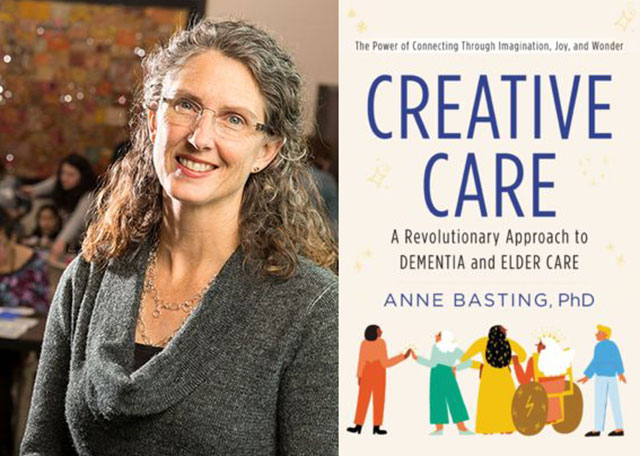Creative Care – Book Review by Susan H. McFadden
Posted in News, General | Tagged in creative care, anne basting, revolutionary approach to dementia care, anne basting book review, susan mcfadden book review, dementia journey, dementia awareness, dementia caregiver, dementia friendly, caregiver, susan mcfadden, fox valley memory project

Imagine this: A world where people diagnosed with some type of dementia continue to experience joy and wonder regardless of the progression of their dementia; a world where communities view various forms of long-term care as places for engaging arts and cultural events; a world in which people living with a dementia do not need to be concerned about what they forget, but rather are celebrated for what they can imagine.
Can such a world be possible? In her new book, Creative Care, Anne Basting, founder and president of the nonprofit TimeSlips, shows us that not only is all this possible, but it is happening now in communities around the world that have embraced a new vision for life with dementia. In these communities, people respond to the actions and utterances of those who have dementia with an attitude familiar to anyone who has studied acting and improv: you learn to say “yes, and.” An example she offers is a person who can’t remember the word “ketchup” when referring to that red bottle on the table. Instead of saying, “Mom! I’ve told you a hundred times, it’s ‘ketchup’,” you might say “what do you want to call it?” This creates an emotional connection, an affirmation that the relationship does not hinge on someone’s ability to remember the word “ketchup.”
In her book, Anne vividly depicts the transformative power of asking what she calls “beautiful questions,” questions meant not to probe people’s memory for information, but rather questions that open them to possibilities for meaningful interactions. An example would be this one: “If your feet could speak, what would they say?”
Of course, if you ask such a question, you need to be prepared for an answer, and if the words get mixed up or if the person can only make a sound or gesture, you need to show that you truly have heard what has been expressed. Anne calls this “proof of listening” and she offers many concrete examples of how to do this lovingly and effectively.
After presenting arguments for the urgency of changing our approaches to care for people living with dementia, in the second part of the book, Anne offers concrete suggestions for care partners at home and caregivers working in care communities. Whether engaging one-on-one with someone, or interacting with a group in a care communities, people can learn that the shift “from an emphasis on memory toward the freedom of imagination, opens up meaning-making to those who thought it was beyond their reach” (p39). This is the essence of creative care.
The last section of the book offers examples of how creative care can transform communities in many ways, whether by alerting city officials to dangerous pedestrian crossings that keep elders isolated because they’re afraid to venture out, or by producing plays in care communities created in collaboration with residents, staff, and artists. People connected in some way to Fox Valley Memory Project will recognize her description of performances of the On a Positive Note chorus; Anne has attended several of these performances.
This beautifully written book offers many helpful suggestions for interacting meaningfully and joyfully with persons having dementia, as well as delightful descriptions of “scaling up” creative care for people living at home as well as in some type of residential community. Anne has been developing these models for a quarter century, but in the last few years, this work has taken on an intensely personal aspect as her mother has been diagnosed with “major neurocognitive disorder, of the Alzheimer type” and has moved with Anne’s dad to a care community near her home in Milwaukee. Anne knows well the suffering that accompanies a dementia diagnosis, but she has also experienced the many joys that can flow from embedding creative care in relationships with those living with the diagnosis.
Anne is quite familiar with Fox Valley Memory Project’s work. It has been my great privilege and joy to have been her friend since the late 1990s. I have watched this work develop and I am honored to recommend this book to anyone seeking new ways of thinking about dementia and being in relationship with people who live with it.
Basting, A. (2020). Creative care: A revolutionary approach to dementia and elder care. New York, NY: HarperOne.
Susan H. McFadden
Thanks for sharing. I always learn something new from dementia involved people. Jean